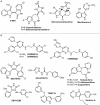GSK-3 Inhibitors: Preclinical and Clinical Focus on CNS
- PMID: 22065134
- PMCID: PMC3204427
- DOI: 10.3389/fnmol.2011.00032
GSK-3 Inhibitors: Preclinical and Clinical Focus on CNS
Abstract
Inhibiting glycogen synthase kinase-3 (GSK-3) activity via pharmacological intervention has become an important strategy for treating neurodegenerative and psychiatric disorders. The known GSK-3 inhibitors are of diverse chemotypes and mechanisms of action and include compounds isolated from natural sources, cations, synthetic small-molecule ATP-competitive inhibitors, non-ATP-competitive inhibitors, and substrate-competitive inhibitors. Here we describe the variety of GSK-3 inhibitors with a specific emphasis on their biological activities in neurons and neurological disorders. We further highlight our current progress in the development of non-ATP-competitive inhibitors of GSK-3. The available data raise the hope that one or more of these drug design approaches will prove successful at stabilizing or even reversing the aberrant neuropathology and cognitive deficits of certain central nervous system disorders.
Keywords: CNS; GSK-3; GSK-3 inhibitors; protein kinases.
Figures



References
-
- Alon L. T., Pietrokovski S., Barkan S., Avrahami L., Kaidanovich-Beilin O., Woodgett J. R., Barnea A., Eldar-Finkelman H. (2011). Selective loss of glycogen synthase kinase-3alpha in birds reveals distinct roles for GSK-3 isozymes in tau phosphorylation. FEBS Lett. 585, 1158–116210.1016/j.febslet.2011.03.025 - DOI - PubMed
-
- Alonso D., Dorronsoro I., Martinez A., Panizo G., Fuertes A., Perez J., Martin E., Perez D., Medina M. (2005). Glycogen synthase kinase-3 inhibitors isolated from marine organisms. WO 2005054221.
LinkOut - more resources
Full Text Sources
Other Literature Sources

